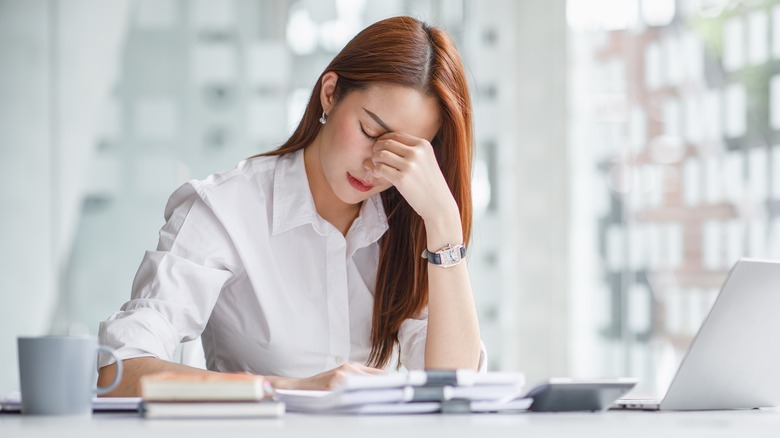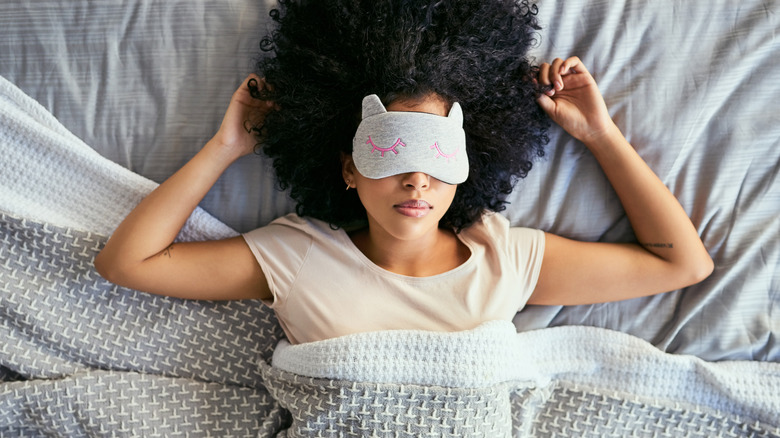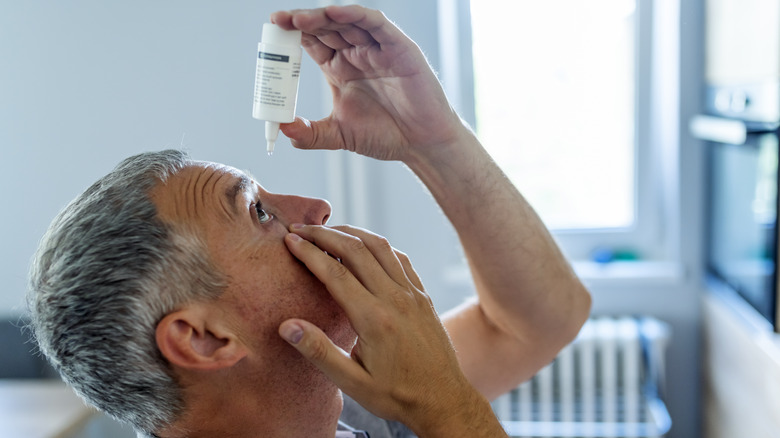Turns Out This Is The Best Sleep Position For Your Eyes
Do your eyes constantly burn or feel dry? You might have dry eye. According to the National Eye Institute, dry eye is fairly common, affecting about 16 million people in the U.S. The glands in your eyes either don't make enough tears or don't produce quality tears. This means your eyes don't get enough lubrication, resulting in a stinging or scratchy feeling in your eyes. Women, people over 50, and those who wear contact lenses are more susceptible to dry eye. If you have an autoimmune condition or don't get sufficient vitamin A in your diet, you also could develop dry eye. And, yes, staring at your digital devices for too long can dry out your eyes as well.
Most people prefer to sleep on their sides, but Eyes Over Copley says sleeping on your side or face down can exacerbate dry eye. These positions run the risk of clogging the membranes of your eyes and drying out your eyes. Instead, try sleeping on your back to see if it eases your dry eye.
Dry eye and sleep position
A 2017 study in Cornea involved 125 people —100 of whom had dry eye disease — and their sleep habits. Those who slept on their left or right side had more severe dry eye than those who slept on their backs.
Sleeping with a fan can soothe your mind and cool your body, but this can also aggravate dry eye. A 2014 article in the Saudi Journal of Ophthalmology studied 48 people who had dry eye and slept in a room with high air flow from air conditioning or a ceiling fan. Those who slept on their sides had more dry eye symptoms and lower production of tears in the contralateral eye. In other words, those who slept on their right side had more problems in their left eye than their right. This was particularly the case in people who had nocturnal lagophthalmos, which is when the eye doesn't close completely during sleep. The authors suggested some options for people with this condition to reduce their symptoms of dry eye, such as sleeping on their back.
Soothing dry eye
If you have nocturnal lagophthalmos you might find that eye drops can help lubricate and seal your eyes while you sleep to keep them from drying out, according to Perspectives Vision Clinic. You might also experience dry eye because your eyes don't produce quality tears. While you're asleep, the tears can evaporate and dry out your eyes. Artificial tear eye drops can provide relief, but it's best to consult with your eye doctor for the best treatment options available. If you use artificial tears long-term to help with your dry eye, be sure they're preservative-free to prevent complications.
Dry air, particularly in winter months, can dry out your eyes, too. Adding a humidifier to your bedroom can alleviate some of the dryness in your eyes. Even mild dehydration can worsen your dry eye, so be sure to stay adequately hydrated. Dry eye is also a symptom of allergies, so be aware of seasonal or indoor allergens that might be affecting you and your eyes. Pollen and other allergens can come into your home through open windows or your clothing and shoes. Be sure to remove and launder your clothes and shower before bedtime to avoid getting these allergens on your pillow while you sleep.



